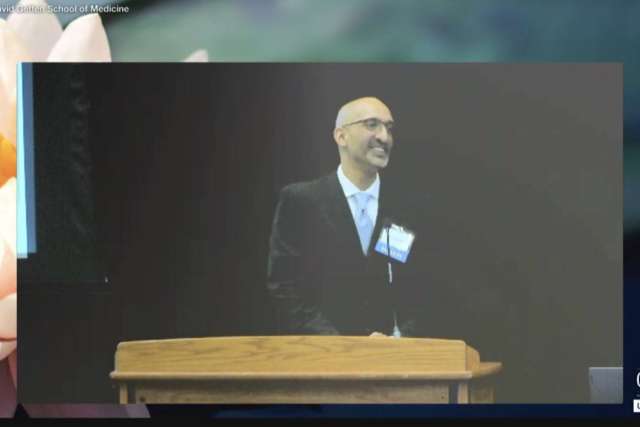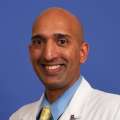Photo:Dr. Ravi Aysola speaks during UCLA Health’s integrative medicine conference, “An Integrated U: Trauma, Grief and Pathways to Healing,” on Nov. 4. (Photo by Sandy Cohen/UCLA Health)
The most common emotion people feel upon being released from intensive care after critical illness is anger, says Ravi Aysola, MD.
“It’s not easy to sometimes articulate that anger, because it seems unjustified,” Dr. Aysola said at UCLA Health’s integrative medicine conference on Nov. 4, “An Integrated U: Trauma, Grief and Pathways to Healing.”
“Shouldn’t you be grateful? Yes, profoundly grateful,” he continued. “It’s a very complex relationship and it’s not easy to sort out.”
A pulmonary critical care and sleep medicine specialist, Dr. Aysola is helping patients make sense of the complex emotions associated with post-ICU syndrome through UCLA Health’s new Post-ICU Recovery and Resilience support group, which he facilitates with integrative medicine expert Rashmi Mullur, MD.
Post-ICU syndrome
Two-thirds of people leaving ICU care experience post-ICU syndrome: a collection of physical, psychological, interpersonal and cognitive challenges associated with hospitalization for critical illness.
Tending to these issues through post-ICU clinics — such as the one UCLA Health established in early 2020 and others opening at medical centers across the country — can reduce hospital readmissions and mortality, decrease medication need and begin to address the mental and emotional challenges that result from ICU hospitalization, Dr. Aysola said.
“The most valuable factor (is) an awareness of what to look for and what to ask,” he said. “Because people often don’t know what’s going on when they’re recovering and they don’t know what normal is supposed to be. They’ve just come out of a life-altering experience and are trying to find their bearings.”
Patients may be admitted to intensive care if they need advanced respiratory support, such as intubation, or support for multiple organ systems.
Providing post-hospitalization support for these patients is something Dr. Aysola cares deeply about as a survivor of critical illness himself.
First-hand experience
Dr. Aysola said he was hospitalized as a young man and was on ventilatory support for two weeks. He couldn’t speak or swallow for months and spent more months using a wheelchair, then a cane, to walk.
“Prior to critical illness, I was a collegiate athlete,” he said. “When I returned to college, I had lost nearly 60 pounds, mostly muscle mass, and was walking with a cane and needed a lot of help with the routine things you do every day.”
This was in 1992, when post-ICU syndrome was less understood and far fewer resources existed, he said.
He recalled being full of doubt after his release from the hospital. Were his cognitive abilities intact? Would he recover? Was he still the same person as before he was hospitalized?
Among the many losses associated with post-ICU syndrome is loss of identity, Dr. Aysola said.
“There’s just an existential malaise,” he said. “Why am I here? What is this? Why did this happen to me? And, really, that’s something that’s difficult to quantify and come up with an easy treatment plan for.”
One of his most memorable days of recovery, he recalled, was a field trip to the mall. He was still in a wheelchair, but on this day he was in the back seat of a car on a sunny Southern California day, windows rolled down and the wind whipping through his hair.
“I hadn’t been outside in so long,” he said. “It was just the most amazing experience.”
He has carried that lesson of the profundity of small joys with him into his professional life. After long nights working in critical care, he restores himself with sunshine.
“I’d walk outside, sun on my face, walk down the street, get a Fatburger and take a nap on the beach,” he said.
Today, Dr. Aysola’s wellness practices include vigorous exercise, meditation, art, nature and spending time with his family.
“One of the things I’ve learned over time is the path to healing is through your nightmares,” he said. “Because it’s a beautiful world. And we don’t often appreciate that until we lose it.”




